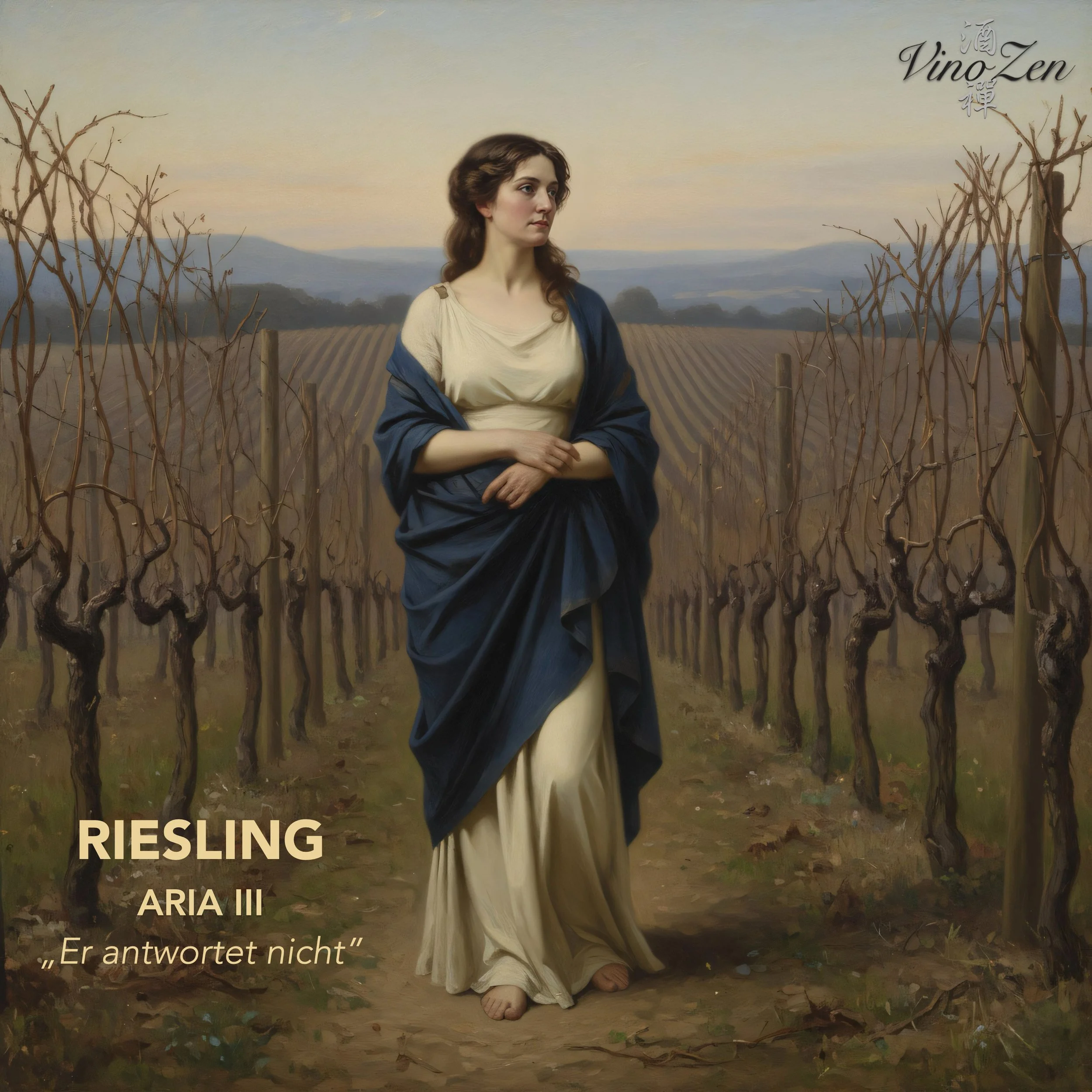Riesling Arie III: Er Antwortet Nicht
Overview
Title: Riesling
Concept: A mythic, conceptual opera detailing the life of Liesel, a German girl born in Alsace who grew up during World War II.
Plot: As a child in the late 1930s, Liesel meets and befriends a young boy who is the literal personification of the spirit of Riesling. Their bond is magical and secret. A key supernatural element of their relationship is that the boy-spirit ages to 35 and then stops, remaining timeless, while Liesel, a mortal, continues to grow old. The opera is not a simple love story but a profound, lifelong exploration of mortality, time, memory, and a human's elemental connection to the land.
Riesling Aria III
Title: "Er antwortet nicht" ("He Doesn't Answer")
Setting: This is a climactic, dramatic lament sung by Liesel in her late 30s/early 40s. The aria takes place post-harvest in 1971, a legendary, "vintage of the century" for Alsace Riesling. It is performed by the same Rénée who appeared in Blind on the Hill. There’s more to it than what appears.
Overview: The aria captures the central crisis of Liesel's life. In the very year that Riesling (the spirit) is at his most glorious, potent, and universally celebrated, he has inexplicably fallen silent to her…again.
HYPERFOLLOW PAGE: Links to major streaming platforms and social media
Inspiration: Riesling
Riesling is an arguably under-appreciated grape, yet it is incredibly versatile, with a complexity, longevity, and deep history that few can match. I was exploring ways to express its many faces when I landed on a single, experimental concept: What if it were an opera?
This project both excites and humbles me. I was, and remain, afraid of not being able to show this grape the profound respect it deserves, but the idea was too compelling to ignore.
The legendary ageability of well-made Riesling became the foundation of the story. From that single seed, the narrative naturally grew. It became a story that would have to explore periods of great conflict, the pain of what is lost and found across time, and a sense of longing that spans generations. It is, like the wine itself, a story of mortality, time, and the voice of the land.
Without spelling it all out, it would be of my great honour if you could experience the track and the music video with the same connection as I did making them.
Lyrics
Er kam wie Regen. (He arrived like rain.)
Er kam nicht mit Namen, (He arrived without a name,)
nur mit Duft nach Stein. (only with the scent of stone.)
Ich gab ihm meine Stimme— (I gave him my voice—)
und er verschwand im Wind. (and he vanished into the wind.)
Riesling… (Riesling…)
Dein Name liegt noch auf meiner Zunge. (Your name still rests upon my tongue.)
Ich habe ihn in jeden Fassdeckel geflüstert, (I’ve whispered it into every barrel lid,)
in jeden Schnitt, (into every cut,)
in jeden Tautropfen. (into every dewdrop.)
Aber jetzt… jetzt höre ich nichts. (But now… now I hear nothing.)
Ich rufe in die Reben— (I call into the vines—)
er antwortet nicht. (he does not answer.)
Kein Flüstern im Laub, (No whisper in the leaves,)
kein Tropfen auf Stein, (no drop upon stone,)
kein Glanz im Glas. (no gleam in the glass.)
Nur Stille. (Only silence.)
Nur Stille. (Only silence.)
Du hast gesagt, (You said,)
die Wurzeln erinnern. (the roots remember.)
Du hast gesagt, (You said,)
die Stimme des Steins vergeht nie. (the voice of the stone never fades.)
Aber der Boden ist trocken. (But the soil is dry.)
Der Hang ist stumm. (The slope is mute.)
Und meine Kehle… brennt. (And my throat… burns.)
Riesling… (Riesling…)
Kleiner Gott aus Säure und Licht… (Little god of acid and light…)
Wenn du Wind bist—hauche. (If you are wind—breathe.)
Wenn du Stein bist—klinge. (If you are stone—resonate.)
Wenn du gegangen bist… (If you are gone…)
warum schmecke ich dich noch? (why do I still taste you?)
Er antwortet nicht. (He does not answer.)
Aber ich höre weiter. (But I keep listening.)
© 2025 VinoZen Canada Inc. | Lyrics, Stories & Lore by Kai Chang. Sound Recording owned by VinoZen Music. VinoZen™ and Character Likenesses are trademarks of VinoZen Canada Inc.

